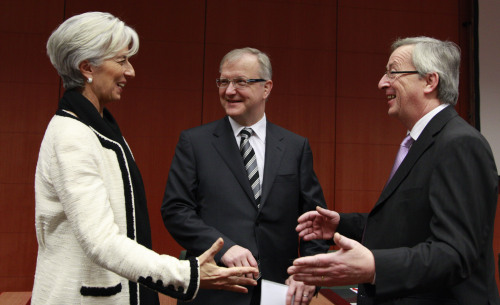Eurozone to put up $674b for post-2013 bailout fund, disagreement over debt crisis
BRUSSELS (AP) ― European finance ministers decided Monday to provide 500 billion euros ($674 billion) for a new crisis fund that will come into force in 2013, but continued to fight over the best way to combat the current debt crisis that has crippled the eurozone over the past year.
The ministers “agreed on the provisional volume of 500 billion euros, which will be revised every other year,” said Jean Claude Juncker, the prime minister of Luxembourg who chairs the regular meetings of the 17 eurozone finance ministers.
Additional financing for the so-called European Stability Mechanism will come from the International Monetary Fund, which is already contributing one third of the region’s existing 750 billion euro crisis fund.
While Juncker did not say how much money will come from the IMF in the future, the European Union’s Monetary Affairs Commissioner Olli Rehn said it was an “unwritten understanding” that the fund would provide 50 cents for every euro spent by the eurozone members.
The European Stability Mechanism will succeed the European Financial Stability Facility, the eurozone’s 440 billion euro contribution to the overall fund, in 2013.
 |
From left: French Finance Minister Christine Lagarde, European Commissioner for the Economy Olli Rehn and Luxembourg’s Finance Minister Jean Claude Juncker share a word during a meeting of eurozone finance ministers at the EU Council building in Brussels on Monday. (AP-Yonhap News) |
While the decision on the new mechanism is a big step in showing that the currency union is prepared to stick by its weaker members, immediate investor concern centers on the eurozone’s ability to deal with the existing crisis.
Ministers didn’t reach a decision on boosting the size and powers of the exciting facility, which at the moment can only give about 250 billion euros ($336 billion) in loans because of several capital buffers required to make the bonds it issues to raise money attractive to investors. Juncker said that the 500 billion euros promised to the new mechanism will constitute its effective lending capacity and won’t be diminished by capital buffers.
Monday’s meeting came amid renewed jitters on European bond markets. The interest rates on Portuguese government bonds were near euro-era highs, heightening speculation that the country might soon have to follow Greece and Ireland in seeking international help to service its rising debts.
“The situation on sovereign debt markets remains disturbing,” Juncker told reporters. That statement echoed earlier comments from Luxembourg’s finance minister Luc Frieden, who said Portuguese yields have been rising “probably because we are too slow in taking the relevant decisions.”
His German counterpart Wolfgang Schaeuble, however, cautioned against rushing into new measures. “At the moment financial markets are so stable that it is probably better if we don’t disturb them with unnecessary discussions,” Schaeuble said.
Eurozone officials have promised to present a “comprehensive response” to the debt crisis by the end of March.
The European Commission, the European Union’s executive, and some member states have been pushing governments to give the European Financial Stability Facility new powers ― such as buying government bonds on the open market, stabilizing their prices ― and increasing the facility’s funding so it can actually lend out the full 440 billion euros.
On top of that, the Commission has suggested lowering the interest rates Greece and Ireland have to pay for their bailouts.
Yet, no decisions were taken Monday on more immediate crisis measures. “Nothing is agreed until everything is agreed,” said Juncker.
At the center of this all-or-nothing debate is Germany, the biggest contributor to the EFSF. Berlin has said it will only back new powers and money for the existing facility if in return the region’s stragglers commit to making their economies more competitive.
That demand, backed by France, has created discord among eurozone governments, with some complaining that the demanded measures distract from plans to enhance economic governance in the currency union already tabled by the Commission. France and Germany say that the concrete measures to be included in their so-called “pact for competitiveness” are still up for debate, but according to documents circulated a few weeks ago they could contain demands to raise retirement ages, add limits to public debt to national constitutions and come up with a common base for corporate taxation.
“I’m not sure that the Franco-German proposal is the best way” to improve competitiveness, said Jyrki Katainen, the Finnish finance minister. He suggested that it might be more efficient to tag some of the suggested measures onto the Commission plans that are already more advanced.
The debate comes as cracks appeared in the willingness of political decision makers in bailed out Greece and Ireland to go along with the tough requirements of their rescue programs. The Greek government over the weekend issued an angry statement, accusing the European Union and the International Monetary Fund ― responsible for a large portion of the bailout ― of overstepping their role and interfering in its internal affairs. They are unhappy about a new requirement for the Greek government to sell off 50 billion euros ($67 billion) in state assets by 2015, far more than previously agreed.
In Ireland, the two parties likely to win general elections scheduled for Feb. 25 have said they want to renegotiate the terms of the countries’ bailout program and signaled that they are unwilling to inject much more money into Ireland’s struggling banks.
